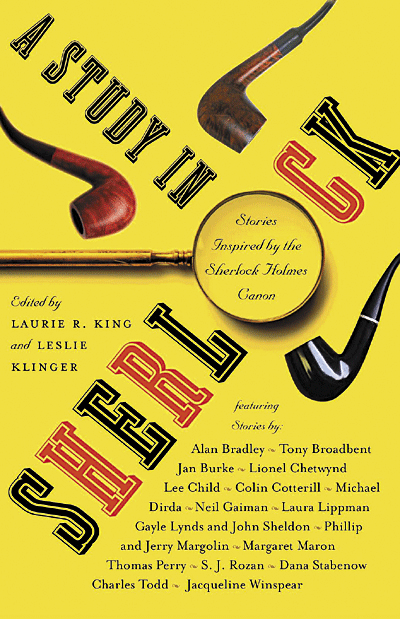A STUDY IN SHERLOCK: STORIES
INSPIRED BY THE HOLMES CANON
Edited by Laurie R. King and Leslie S. Klinger
Bantam Books, 2011
385 pages, $15
ISBN 978-0-8129-8246-6
No other fictional detective has been written about more than Sherlock Holmes, the famous “consulting detective” created by Sir Arthur Conan Doyle (1859-1930) in the late 1800s. Doyle’s four novels and 56 short stories about Holmes and Dr. Watson have spawned countless stories written by modern authors.
“A Triumph of Logic” is a Sherlockian short story written by two Mainers, the wife and husband writing team of Gayle Lynds and John Sheldon of Westbrook, both with impressive writing pedigrees. Their story is contained in the latest collection of Holmes stories, A STUDY IN SHERLOCK, along with 16 other contributed work.
The Lynds and Sheldon tale takes place in modern-day Maine, with Franklin County Judge Linwood Boothby and his clerk, Artie Morey, puzzled by the curious murder of a court reporter. The men are ardent fans of Sherlock Holmes and use his methods to investigate the crime, paralleling Holmes’ adventures, offering a surprising conclusion and an even more intriguing subplot (with Watson as a murder suspect). Lynds and Sheldon clearly had fun with this clever yarn, and are most deserving of top billing among these short stories.
Several stories feature Holmes and Watson, one even has Doyle flummoxed and defeated by a strange lawsuit, and still others offer delightfully irreverent Holmes wannabes solving crimes, often surprising themselves and others in the process.
In “The Bone-Headed League,” author Lee Child tells of an FBI agent in London so involved with the decoy plot in a famous Holmes story (of similar name) that he forgets who is the decoy. Other excellent stories include Holmes engaged in a fascinating conversation with a killer, reveal an ingenious plot by archvillains Professor Moriarty and Colonel Moran to confuse Holmes, and describe how Holmes and Watson willingly assist in a presidential assassination.
MOXIE: MAINE IN A BOTTLE
By Jim Baumer
Down East Books, 2011
76 pages, $14.95
ISBN 978-1-60893-043-2
Most Mainers have heard of Moxie the soft drink. A few might even know that Moxie is the official soft drink of Maine. Very few, however, know that Moxie was not invented in Maine and was never produced here. Why then does Moxie have such a popular cult following?
Durham author Jim Baumer provides a few answers, a few questions and lots of fun in his anecdotal history MOXIE: MAINE IN A BOTTLE. Baumer has taken Maine’s adopted soft drink and turned its story into a fun tale of how a medicinal elixir created in 1885 became an iconic beverage.
Baumer tells how Moxie inventor, Dr. Augustin Thompson of Lowell, Mass., created Moxie as a “liquid preparation charged with soda for the cure of paralysis, softening of the brain and mental imbecility.” A skeptic might think he intended to market it to politicians.
Anyone who has tasted Moxie either loves it, hates it or won’t admit to either. Its bitter gentian root flavor is best described by Maine humorist Gary Crocker: “It tastes a little like root beer — that’s gone wicked bad!”
Nonetheless, clever marketing between 1885 and the 1920s saw Moxie outselling Coca-Cola and Pepsi, and its popularity today is marked by the Moxie fan club called the New England Moxie Congress, and the annual Moxie Festival held in July in Lisbon Falls (July 13-15 this year). At the festival folks can witness the stomach-churning Moxie chugging contest, eat Moxie ice cream, buy a Moxie cookbook and even learn how to make Moxie cocktails like the Welfare Mom and the Mad Mailman.
Baumer also cleverly introduces readers to the “Mayor of Moxieville,” the wildly popular Moxie Bottle Wagons and Horsemobiles, the handsome and virile Moxie Man and why the Moxie lollipop was such a flop.
— Bill Bushnell lives and writes in Harpswell.
Send questions/comments to the editors.



